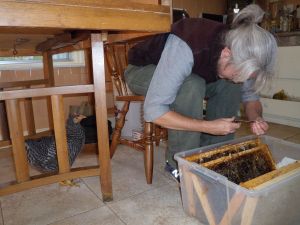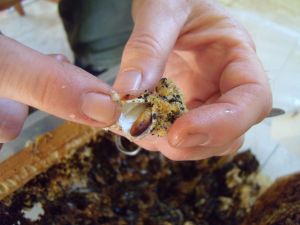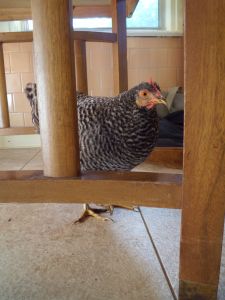Our darling Petunia is ailing. The vet recently suggested that she is ‘fading away’, pointing to her loss of appetite, frequent lethargy, and white blood cells that appear ‘squashed’ and misshapen in every blood test she’s ever had. Yes, our chicken has had multiple blood tests.
She’s certainly never been the healthiest bird in the flock, suffering from recurrent oviduct infections over her almost three-year life. We finally put her on chicken birth control this past spring, which stopped her laying, brought her hormones down to normal levels, and cleared up her chronic infections.
I’m suspicious that her second, rather halfhearted, autumn molt of the year (she lost only her tail feathers) may be to blame for her behavior changes, rather than an awful virus affecting one chicken in the flock, or a progressive congenital disease, as the vet suggested. We’ll wait and see.
For now, Bell, a Welsummer, and the loudest chicken we’ve ever met, is seizing the opportunity to become top chicken. We hope her reign is short-lived. She’s got the bossy piece down, but she’s a poor forager, has terrible anxiety, and is less fair-minded than Petunia.
While she’s under the weather, we’re giving Petunia the royal treatment, attending closely to her excessively finicky dietary whims and general comfort. I’m aware that many (most?) backyard chicken-keepers don’t take their birds to the vet, particularly when the bird is no longer laying. When we started out with our first chicks nearly three years ago, I didn’t anticipate how attached we’d become, or how much these small-brained creatures would worm their way into our hearts. Chickens have big personalities. They’re social and affectionate, and highly expressive.
So here we are, muddling through as usual, using half head and half heart. Petunia is dear to us. It’s cold outside (California, SF Bay Area cold, in the state’s warmest year on record–but still, chilly). Petunia has alway been slight, sleeping in a nest box in winter to keep warm. Chickens are notoriously cold-hardy animals. The vet thinks she’s fading away.
We couldn’t take it anymore a few weeks ago and started bringing her in to sleep in the straw-stuffed cat crate. Every morning at first light she gives an assertive and lengthy cackle from across the bedroom to let us know she’s ready to start her day. At the vet’s suggestion, she gets a capsule of fish oil down the gullet once a day to support her coronary functioning, as well as dandelion root and milk thistle seed extracts to support her liver. Egad.
Her appetite’s been poor, so we offer her favorite treats, like sunflower and hemp seeds. We also scramble her an egg every day–she likes it thoroughly scrambled and dry. If it’s too warm, or too wet, or too oily, she shakes her beak vigorously and repeatedly, wiping it on the floor, and we know she will not be tempted by any more of our tempting treats for a good long while. She stalks off under the kitchen table and stands staring into space, or she preens her beautiful new set of feathers.
Even when she disdains our culinary offerings, she’ll be damned if anyone else eats. Sometimes we bring Luma (aka ‘Baby Tiny’) in to inspire Petunia’s appetite–a kind of competitive, race-to-the-finish mealtime. For a minute, Petunia stands by passively, as Luma guzzles the feast. Then, some primal chicken instinct kicks in and she towers over the much larger Baby Tiny, making a series of intimidating guttural clucks.
Kelly has always been a better, more attentive mother than I. But she’s gone to new extremes for Petunia. Discovering that a crate of extracted honey frames was infested with wax moths, Kelly sensed opportunity. Not only does she pluck out the mature moths for Petunia to snap out of the air (a favorite treat, so long as there’s not too much honey on them), she also cuts wax moth pupae out of their tough, fibrous cocoons and hand-feeds them to our little chicken.
Last weekend, friends arrived to share a meal and an evening of board games with us, and we had to explain why there were two chickens pecking at a pile of seeds and oats and scrambled egg on the kitchen floor.
I have to say, though, there’s something warm and friendly about having Petunia join our indoor life. She often enters into conversations with her delightfully wide range of vocalizations, or hops up on a lap for some very serious eye contact and ‘lite’ snuggles before bed. And whether it’s caused by the end of her molt, her fabulous diet and supplements, or just the extra TLC, she seems to be regaining at least some of her appetite and energy.





2 Responses to Indoor Chickens